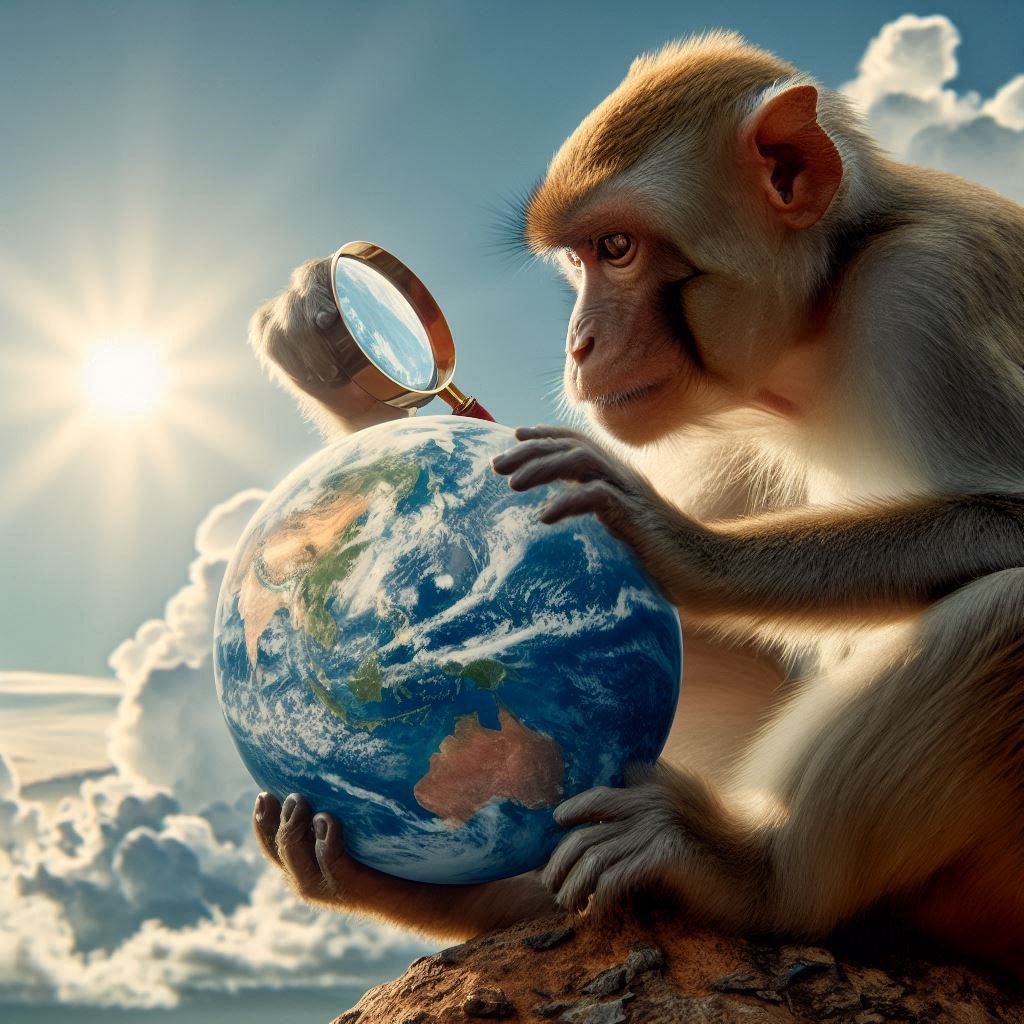
Could Monkeys Be the Key to Saving the Planet? – Examining Their Intelligence in Conservation Efforts
Share
Could Monkeys Be the Key to Saving the Planet? – Examining Their Intelligence in Conservation Efforts
In the global race to address environmental crises, we often turn to technology, policy changes, and human innovation. But what if the answer to saving the planet was staring us right in the face—within the animal kingdom, specifically among monkeys? Known for their intelligence, social structures, and complex behaviors, monkeys may have more to offer in conservation efforts than we realize. Let’s explore whether monkeys could actually play a pivotal role in saving the planet.
1. Monkeys and Ecosystem Balance
Monkeys are vital players in their ecosystems, and their survival is intricately tied to the health of the environments they inhabit. These animals are not just passive creatures; they actively shape and maintain the ecosystems around them.
Seed Dispersal
Monkeys, especially frugivorous species like howler monkeys and spider monkeys, play a significant role in seed dispersal. As they eat fruits and plants, they inadvertently spread seeds across large areas, helping to regenerate forests and preserve plant biodiversity. This process is essential for maintaining healthy ecosystems, as it encourages plant growth, stabilizes the soil, and supports other wildlife.
• Forest Regeneration: Monkeys are key players in the regeneration of tropical rainforests, which are vital to the planet’s climate health. Without these seed-dispersing animals, many plants wouldn’t thrive, leading to biodiversity loss and weakened ecosystems.
Pollination
In addition to seed dispersal, monkeys contribute to pollination by transferring pollen as they forage for nectar and fruits. While they are not the primary pollinators like bees, their behavior still contributes to the pollination of various plants. This helps maintain healthy ecosystems, as plants that rely on pollination remain productive, which in turn supports the food chain.
• Supporting Food Chains: Plants that monkeys pollinate provide sustenance to countless other species, from insects to herbivores to omnivores. A disrupted plant ecosystem could have far-reaching consequences, and monkeys are integral to sustaining that balance.
2. Monkeys and Their Role in Preserving Forests
Monkeys often live in forests, especially rainforests, which are under constant threat from deforestation, logging, and agriculture. The presence of monkeys in these ecosystems is not just symbolic—they help to preserve them through their behaviors and interactions with the environment.
Forest Health Indicators
Monkeys can act as important indicators of the health of their habitat. Because they rely on a diverse range of plant species for food, their population numbers can signal the overall health of the forest. When monkey populations begin to decline, it may indicate that their environment is deteriorating due to habitat loss, pollution, or other human-induced factors.
• Early Warning System: The decline in monkey populations could serve as an early warning system for environmental degradation. Monitoring their behavior, health, and movement patterns could help conservationists identify at-risk areas in need of immediate attention.
Forest Protection by Presence
Monkeys are incredibly important in maintaining forest integrity through their role as “keystone species.” Their presence in a forest means that the ecosystem is likely thriving, as they are often among the first animals to leave or perish when the environment becomes unsuitable. As primates living in trees, monkeys can also prevent overgrazing by herbivores, indirectly keeping plant life flourishing.
• Natural Guardians of the Forest: The presence of monkeys in a forest is an indicator of a healthy, thriving environment. As deforestation continues to be one of the most pressing threats to the planet, finding ways to protect monkeys’ habitats could directly contribute to saving the forest ecosystems they help sustain.
3. Monkeys and Their Problem-Solving Skills in Conservation
Monkeys are intelligent creatures known for their impressive problem-solving abilities. They are capable of using tools, planning for the future, and demonstrating social cooperation—traits that may seem more human than animal. Could these cognitive abilities be harnessed in a way that contributes to conservation efforts?
Tool Use in Environmental Conservation
Monkeys are known to use tools to access food or navigate their environment, but some species go further. Chimpanzees, for example, have been seen using sticks to extract termites from mounds or rocks to crack nuts. This capacity for tool use could extend to conservation efforts.
• Environmental Problem Solvers: Imagine a world where monkeys could be trained to use tools for more specific purposes, such as helping with environmental monitoring, tree planting, or even assisting in habitat restoration efforts. Their ability to learn and adapt could make them valuable assets in tackling specific environmental challenges.
Social Intelligence and Collective Action
Monkeys are highly social animals that live in complex societies with clear hierarchies and cooperative behaviors. This social intelligence could be applied to conservation efforts, especially in areas that involve community-based action.
• Collaboration for Conservation: In some areas, monkeys have been seen working together in groups to achieve a common goal. This kind of collective action could be a model for human-led conservation efforts. If monkeys’ social structures could be leveraged in conservation, they might be able to help raise awareness or participate in actions that protect their environments—whether it’s guiding humans to endangered areas or reinforcing conservation laws.
4. Monkeys as Ambassadors for Conservation
Monkeys are charismatic animals, often seen as the “face” of conservation due to their close genetic relationship to humans. They capture the public’s imagination and can raise awareness about broader environmental issues.
Engaging the Public
Monkeys are a familiar and relatable species, making them excellent ambassadors for conservation. Documentaries like Planet Earth and viral social media videos featuring monkeys can draw attention to important environmental issues. Their playful nature and striking intelligence appeal to people across the globe, making them perfect spokesanimals for the protection of endangered species and ecosystems.
• Raising Awareness: By focusing on monkeys in conservation campaigns, organizations can generate public interest in broader environmental issues. This can lead to increased funding, more protected areas, and policies that focus on preserving not just monkeys but the biodiversity of their ecosystems.
Eco-Tourism and Monkey Conservation
Monkeys are central to the eco-tourism industry in many regions. Tourists travel to rainforests, jungles, and national parks to observe monkeys in their natural habitats, often boosting local economies and providing incentives for governments to protect these areas. The preservation of monkeys’ natural habitats can be linked to the success of eco-tourism, which provides long-term sustainable benefits for local communities and the environment.
5. Challenges and Considerations
Despite their potential, there are several challenges to consider when looking to monkeys as a solution to environmental problems.
• Human-Monkey Conflicts: In some areas, monkeys come into conflict with human populations, especially in agricultural regions where they raid crops. Managing these conflicts while ensuring the protection of monkeys and their habitats is a complex issue that requires innovative solutions.
• Loss of Habitats: Many monkey species are endangered, primarily due to habitat loss from deforestation, hunting, and the encroachment of human activity. While monkeys may be able to help regenerate their ecosystems, they still need a safe place to live in order to be effective players in conservation.
• Species-Specific Solutions: Different monkey species have different roles in their ecosystems. Not all monkeys may have the same ability to contribute to environmental conservation, so efforts should be tailored to specific species and habitats.
Conclusion: Could Monkeys Save the Planet?
Monkeys have the potential to be powerful allies in the fight for environmental conservation. Their intelligence, adaptability, and vital roles in ecosystems make them key players in maintaining biodiversity, protecting forests, and restoring ecological balance. By understanding their behaviors and harnessing their natural skills, we might be able to use monkeys to help address some of the planet’s most pressing environmental challenges.
However, this requires us to protect their habitats, reduce human-wildlife conflict, and work toward creating sustainable, wildlife-friendly practices. If we can balance the needs of monkeys with human conservation efforts, there’s a chance that they could indeed play a pivotal role in saving the planet.
CyberMutz.com (Dog-Themed Apparel & Accessories)
“CyberMutz.com – Explore a unique collection of dog-themed apparel, accessories, and gifts for pet lovers. Shop stylish, high-quality designs featuring your favorite dog breeds!”
Category Page Descriptions:
• Dog Breed T-Shirts: “Show off your love for dogs with our exclusive breed-themed T-shirts. From German Shepherds to Chihuahuas, find high-quality, comfortable tees celebrating your favorite pup!”
• Dog Breed Pet Tank Tops: “Keep your furry friend stylish and comfortable with our dog breed-themed pet tank tops. Perfect for small and large dogs, these unique designs are a must-have!”
• Funny Dog-Themed Apparel: “Love dogs and humor? Our funny dog-themed apparel blends style with witty canine-inspired designs. Shop now for T-shirts, hoodies, and more!”
• Personalized Dog Merchandise: “Customize your dog lover’s gear with our personalized pet-themed apparel and accessories. Create a one-of-a-kind look for yourself or a perfect gift for a fellow dog enthusiast!”
CyberPussyKatz.com (Cat-Themed Apparel & Accessories)
“CyberPussyKatz.com – Celebrate your love for cats with our premium collection of feline-inspired apparel and accessories. Purr-fect designs for every cat lover!”
Category Page Descriptions:
• Cat Breed T-Shirts: “Showcase your favorite feline friend with our stylish cat breed-themed T-shirts. From Maine Coons to Siamese, find the perfect tee for cat lovers!”
• Funny Cat-Themed Apparel: “Express your quirky side with our funny cat-themed T-shirts, hoodies, and more. Pawsome designs for those who love cats and humor!”
• Personalized Cat Merchandise: “Make it personal with custom cat-themed apparel and accessories. Create a unique gift or a special piece just for you!”
CyberMunkiez.com (Monkey-Themed Apparel & Accessories)
“CyberMunkiez.com – A fun collection of monkey-inspired apparel and accessories. Perfect for primate lovers who enjoy bold, playful, and unique designs!”
Category Page Descriptions:
• Monkey-Themed T-Shirts: “Go bananas over our monkey-themed T-shirts! Whether you love capuchins, chimps, or gorillas, our designs bring out your wild side.”
• Funny Primate Apparel: “Add a touch of humor to your wardrobe with our hilarious monkey and ape-inspired apparel. Great for animal lovers and jungle enthusiasts!”
• Custom Monkey Merchandise: “Make it yours! Personalize your favorite monkey designs on T-shirts, hoodies, and more for a one-of-a-kind look.”
